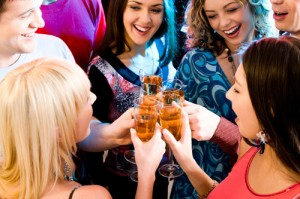 This post was contributed by Dr Dominic Conroy, a Research Fellow in the Department of Psychological Sciences at Birkbeck. Dr Conroy is currently working on an NIHR-funded study with Professor Jonathan Smith to explore adolescents with conduct disorders’ experiences of multisystemic therapy.
This post was contributed by Dr Dominic Conroy, a Research Fellow in the Department of Psychological Sciences at Birkbeck. Dr Conroy is currently working on an NIHR-funded study with Professor Jonathan Smith to explore adolescents with conduct disorders’ experiences of multisystemic therapy.
 Understanding how to successfully encourage university students to understand and heed government drinking recommendations remains one of the holy grails of health promotion research. One aspect of these drinking recommendations is to encourage individuals to take two ‘dry days’ per week where they do not drink any alcohol at all (National Health Service, 2014). In research recently published in the British Journal of Health Psychology, my research colleagues Dr Paul Sparks and Dr Richard de Visser and I were interested in assessing an exercise designed to explore how students might be encouraged to consider how occasional non-drinking during social occasions could be thought of as a more beneficial, achievable behaviour.
Understanding how to successfully encourage university students to understand and heed government drinking recommendations remains one of the holy grails of health promotion research. One aspect of these drinking recommendations is to encourage individuals to take two ‘dry days’ per week where they do not drink any alcohol at all (National Health Service, 2014). In research recently published in the British Journal of Health Psychology, my research colleagues Dr Paul Sparks and Dr Richard de Visser and I were interested in assessing an exercise designed to explore how students might be encouraged to consider how occasional non-drinking during social occasions could be thought of as a more beneficial, achievable behaviour.
 This experiment involved a ‘mental simulation’ exercise in which 211 undergraduate student participants were encouraged to ‘mentally simulate’ possible benefits of socialising without drinking alcohol and/or possible strategies which might make not drinking during a social occasion more straightforward. Findings indicated that compared with maintaining a drinks diary, mentally simulating benefits led to reduced overall weekly consumption, and mentally simulating strategies involved in non-drinking led to reduced episodes of heavy episodic drinking. Findings also suggested that all participants held more favourable perceptions of non-drinkers than they had at baseline, though not significantly so.
This experiment involved a ‘mental simulation’ exercise in which 211 undergraduate student participants were encouraged to ‘mentally simulate’ possible benefits of socialising without drinking alcohol and/or possible strategies which might make not drinking during a social occasion more straightforward. Findings indicated that compared with maintaining a drinks diary, mentally simulating benefits led to reduced overall weekly consumption, and mentally simulating strategies involved in non-drinking led to reduced episodes of heavy episodic drinking. Findings also suggested that all participants held more favourable perceptions of non-drinkers than they had at baseline, though not significantly so.
Several indicative areas for future research were clearly identified from this study. Options for delivering health promotion messages containing a non-drinking mental simulation to encourage young people and/or students to consider the achievability and possible advantages involved in periodically not drinking during social occasions are currently being explored in collaboration with DrinkAware. It would also be useful to understand whether improving perceptions of non-drinkers might offer one route toward promoting safer levels of alcohol consumption. So for example, measuring self-reported perceptions of ‘the typical non-drinker’ might provide a useful screening tool for identifying those most at risk of harmful drinking. However, future research might also help clarify how different strands of ‘perceptions of non-drinkers’ are implicated in alcohol-related perceptions and behaviour. For example, it would be useful to understand how beliefs about non-drinking as a behaviour chosen by others or as a personal behaviour imagined or enacted by the respondent may hold links with drinking behaviour, just as ‘perceptions of the prototypical non-drinker’ seem to.
Students face a wealth of social opportunities involving alcohol consumption during their time at university. In this context research must continue to explore ways of encouraging students to think about drinking less during occasions when alcohol consumption is inevitable. This said, findings from my PhD research favour the view that efforts to successfully promote moderate drinking among students may benefit from greater consideration over how to encourage individuals to re-appraise non-drinking as a periodic behavioural option available to them personally. This might include instilling more positive appraisals of non-drinking as a social behaviour in others as well as prompting students to consider non-drinking at some social occasions as something more achievable and holding more distinct benefits than they may had previously thought. At a health promotion guideline level, this would be consistent with recent recommendations to take two ‘dry days’ each week provided by the House of Commons Science and Technology Committee.

What a pity that fetal alcohol spectrum disorder was not mentioned in this study